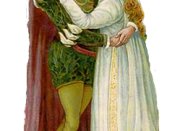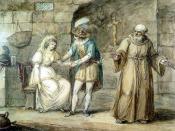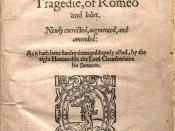The Consequences of Romeo and Juliet
Sometimes authors use a character flaw to make a point about human nature. In his tragedy, Romeo and Juliet, William Shakespeare uses Romeo's impulsiveness to convey his message that rash actions can lead to serious trouble. This idea develops in the beginning of the play when Romeo likes Rosaline, when Romeo is impulsive he is falling in love with Juliet. Last, Romeo is impulsive when he found out that Juliet was dead.
In the beginning of the play, Romeo shows his impulsiveness over Rosaline. Right from the start of the play, Romeo always wants to be with Rosaline. One issue between Romeo and Rosaline is that Romeo loves Rosaline, but Rosaline return Romeo's love. Since Rosaline dosnt return Romeo's love, Romeo is always depressed and seem to be himself. Romeo even admits how he feels when he says, "This is not Romeo. He's some other where" (1.1.206).
This is why Romeo was impulsive when he was in love with Rosaline.
Second, Romeo is very impulsive when he is falling in love with Juliet. Some details that show's impulsivness are that Romeo dosnt find out much details about Juliet when they first met. When Romeo and Juliet fall in love, they dont know what they are getting in to. Even though they know their families are rivals, they don't think much about the situation except being married with there families there. Last, Romeo and Juliet ask Friar Lawrence to marry them even though they have known each other only for a day. Romeo demonstrates his impulsiveness when he says to Friar Lawrence, "It is enough I may but call her mine" (2.6.8). This is why Romeo was impulsive when he was falling in love with Juliet.
Last, Romeo shows impulsiveness when he first...


